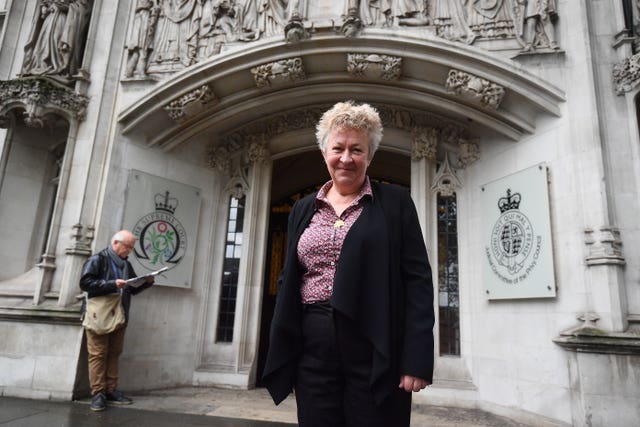
(ADDS PARAGRAPHS 15 TO 29)
A judge who says she was bullied and suffered a breakdown after raising concerns about Government cuts has won a landmark appeal at the UK’s ( highest court.
District Judge Claire Gilham has been involved in a lengthy legal wrangle to have a “whistleblowing” claim aired at an employment tribunal.
A unanimous ruling by five Supreme Court justices on Wednesday means that her case can now proceed at a tribunal.
The judge, who sat at Warrington County Court in Cheshire, says she was “treated detrimentally as a result of raising concerns about systemic failings in the court administration”.
But to date she had suffered defeat in her battle to bring a whistleblowing claim against the Ministry of Justice (MoJ) in the employment tribunal, losing a test case at the Court of Appeal in December 2017.
At the heart of the case are findings that judges are not afforded the legal protections given to whistleblowers under employment legislation because they are not classed as “workers” but are office-holders.
In February 2015, Ms Gilham presented claims to the employment tribunal of “public interest disclosure detriments” – whistleblowing – and disability discrimination.
The disclosures concerned what were said to be poor and unsafe working conditions and an excessive workload in the courts where she was based, affecting herself and other judges.
The MoJ contested the tribunal’s jurisdiction to entertain the whistleblowing claim because she was not a “worker” within the meaning of the 1996 Employment Rights Act.

The Act says: “A worker has the right not to be subjected to any detriment by any act, or any deliberate failure to act, by his employer, done on the ground that the worker has made a protected disclosure.”
Supreme Court justices ruled that the judge, and other judicial office-holders, were entitled to claim the protection given to whistleblowers under the 1996 Act.
Allowing her challenge against the earlier Court of Appeal decision, the justices remitted her case back to the employment tribunal “on the basis that the appellant is entitled to claim the protection given to whistleblowers under the Act.”
Supreme Court president Lady Hale announced: “I can reach no other conclusion than that the Employment Rights Act should be read and given effect so as to extend its whistleblowing protection to the holders of judicial office.”
During the 2017 proceedings, a QC representing the judge said her case was that “she was bullied and overloaded with work to the extent that she suffered a breakdown which led to her being unable to work for years”.
Judge Gilham said after the ruling: “Winning is a great relief after these seven long years.
“Ethically I always knew that my point was right: that judges should have human rights protections.
“You can’t have justice without independent and unafraid judges, and if judges can’t speak out to protect the court system, then justice suffers and the people caught up in the system suffer too.
“I look forward to my claims being heard in the employment tribunal.”
Emilie Cole, a partner at law firm Irwin Mitchell, who has represented District Judge Gilham since the start of the litigation in 2014, said: “This judgment is a great win for my client, Judge Gilham.
“She has fought hard for many years to achieve recognition for whistleblowing protection.
“Widening the scope of whistleblowing protection is fundamentally in the public interest and benefits wider society.
“The recognition by the Supreme Court that an occupational classification is capable of protection as a ‘status’ under Article 14 of ECHR (European Convention on Human Rights) has far reaching consequences.
“Non-contractual office holders are now capable of claiming legal protection for blowing the whistle … this is a massive step forward in equality law and will have wide implications for the greater good. Justice has finally prevailed.”
The Supreme Court ruled that the failure to extend whistleblowing protections to judicial office-holders was a “violation” of District Judge Gilham’s right not to be discriminated against “in her enjoyment of the rights” under the European Convention on Human Rights.
The court said she had been treated less favourably than others who make responsible public interest disclosures protected by the Employment Rights Act.
Lady Hale said: “There is no evidence that either the Government or Parliament addressed their minds to this difference in treatment, nor has any legitimate aim been put forward for it.”
She explained that the object of the protection “was to give workers the confidence to raise malpractice within their organisation rather than placing them in a position where they feel driven to raise concerns externally”.
She added: “It is just as important that members of the judiciary have that confidence. They are just as vulnerable to certain types of detriment as are others in the workplace.
“To give the judiciary such protection might be thought to enhance their independence by reducing the risk that they might be tempted to ‘go public’ with their concerns, because of the fear that there was no other avenue available to them, and thus unwillingly be drawn into what might be seen as a political debate.”


Comments: Our rules
We want our comments to be a lively and valuable part of our community - a place where readers can debate and engage with the most important local issues. The ability to comment on our stories is a privilege, not a right, however, and that privilege may be withdrawn if it is abused or misused.
Please report any comments that break our rules.
Read the rules hereComments are closed on this article